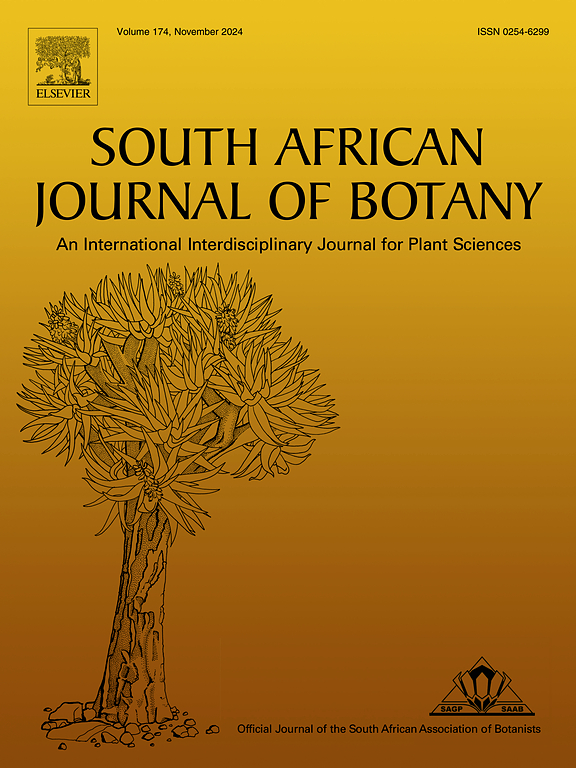几乎消失了,但没有被遗忘:西开普省奥弗伯格Genadendal的蜜丛(Cyclopia spp.)的当地生态知识(LEK)
IF 2.7
3区 生物学
Q2 PLANT SCIENCES
引用次数: 0
摘要
来自当地知识和生态科学的补充信息可以为可持续资源管理的集体决策提供信息。本研究强调了在Overberg(西开普省)Genadendal的历史蜜丛(Cyclopia spp.)采集点的居民中持续存在的当地生态知识(LEK),那里的野生蜜丛采收早于南非蜜丛部门的建立。对32名37-90岁的蜂蜜丛LEK持有者进行了访谈。73%的lek持有者报告说他们一生都住在这个村庄,在Genadendal和附属村庄,有两代到五代的家庭居民。除了广为人知的C. maculata (vleitee)之外,知识持有者还描述了另一种生长在山区栖息地的蜜丛(bergtee)。LEK专题分析表明,当地蜜丛物种的描述性名称与生态分类在重新播种者/重新播种者二分法上是一致的。生态信息还可以从历史处理方法、收获有效性和火灾后再生的描述中获得。68%的受访者报告说,观察到以前丰富的野生蜜丛种群数量下降。火灾、农业用地清理和普遍冷漠被认为是观察到的野生蜜丛种群减少的主要原因,而干旱、洪水和其他与气候有关的变化则较少提及。来自父母和其他长辈的口传LEK是野生蜜丛的主要来源(84%)。受访者指出,老人的去世对当地采集者社区中仍然存在的世代LEK有害。LEK与Fynbos生态科学的结合为南非生物多样性经济框架内的当代集体行动指明了可持续发展的相关途径。随着南非当地采集者和小农加入更广泛的蜜丛生物经济部门的新努力的出现,我们敦促当地行动者和外部附属机构同时保护野生资源和与之相关的LEK。本文章由计算机程序翻译,如有差异,请以英文原文为准。
Almost gone, but not forgotten: Local ecological knowledge (LEK) of honeybush (Cyclopia spp.) at Genadendal, The Overberg, Western Cape
Complementary information from local knowledge and ecological science can inform collective decision-making for sustainable resource management. This study highlights persistent Local Ecological Knowledge (LEK) among residents at historical honeybush (Cyclopia spp.) harvest sites at Genadendal in the Overberg (Western Cape), where wild honeybush harvesting pre-dates the establishment of the South African honeybush sector. Interviews were conducted with 32 honeybush LEK holders aged 37–90 years. Seventy-three percent of LEK-holders reported life-long residency at the rural village, with between two and five generations of family residency reported at Genadendal and annexed villages. Apart from the widely known C. maculata (vleitee), knowledge-holders described another type of honeybush (bergtee) that grows in mountainous habitats. LEK thematic analysis indicated alignment between local descriptive names and ecological categorisation across the reseeder/resprouter dichotomy for local honeybush species. Ecological information could also be derived from descriptions of historical processing methods, harvest availability and post-fire regeneration. Sixty eight percent of interviewees reported observed declines in previously abundant wild honeybush populations. Fire, agricultural land-clearing and general apathy were cited as the main reasons for observed declines in wild honeybush populations, with fewer references to drought, floods and other climate- related changes. Oral transmission of LEK from parents and other elders were the primary sources of wild honeybush (84%). Interviewees cited the passing of elders as detrimental to the generational LEK still present in local harvester communities. Integration of LEK with Fynbos ecological science points to pathways for sustainability relevant for contemporary collective action efforts within South Africa’s biodiversity economy framework. As new efforts emerge amongst local harvesters and small-scale farmers to join the wider honeybush bio-economic sector in South Africa, we urge local actors and external affiliates to simultaneously conserve both the wild resource and the LEK associated with it.
求助全文
通过发布文献求助,成功后即可免费获取论文全文。
去求助
来源期刊

South African Journal of Botany
生物-植物科学
CiteScore
5.20
自引率
9.70%
发文量
709
审稿时长
61 days
期刊介绍:
The South African Journal of Botany publishes original papers that deal with the classification, biodiversity, morphology, physiology, molecular biology, ecology, biotechnology, ethnobotany and other botanically related aspects of species that are of importance to southern Africa. Manuscripts dealing with significant new findings on other species of the world and general botanical principles will also be considered and are encouraged.
 求助内容:
求助内容: 应助结果提醒方式:
应助结果提醒方式:


